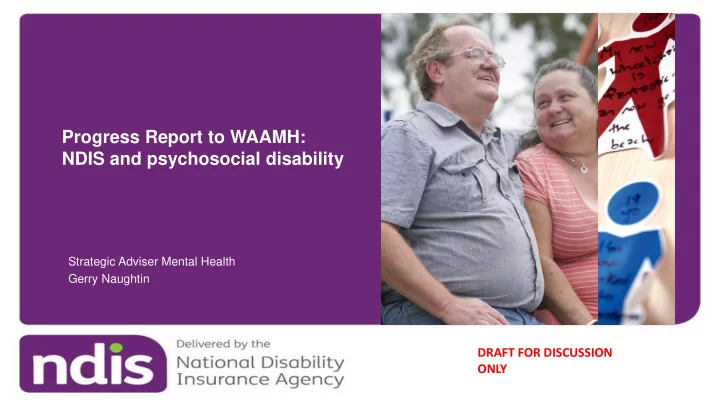

Progress Report to WAAMH: NDIS and psychosocial disability Strategic Adviser Mental Health Gerry Naughtin DRAFT FOR DISCUSSION ONLY
Where we are up to? • Numbers: 31,000 participants (9.1% with a primary psychosocial disability0. Half way towards projected numbers • Access : 67% applicants meeting access criteria. 33% not meeting them • Consistent numbers entering the Scheme: Busy period next 12 months • Plan utilisation: Plan utilisation rates are averaging @54% of committed annualised supports. Increasing year by year. • Package $: Substantially above historical levels: 66% of packages in $20k - $100 K range; 20% less than $20K and 14% $100K + • New to support: Continuing trend of @30% people meeting access new to the Scheme • Growing supply of service: 34% growth in numbers of registered providers providing supports to people with primary psychosocial disability • Growth in claims: 71% growth in claims for supports for psychosocial disability in last 12 months. Significant growth projected over next 12 months
Disability Reform Council Reform Agenda on Psychosocial disability • October 2019 Disability Reform Council approved a package of actions on psychosocial disability • Actions: • Linking and referral of ineligible people to alternative sources of support • Improving access and numbers in the Scheme with primary psychosocial disability • Stronger focus on recovery in scheme • Funding of a new support item called Psychosocial Recovery Coach • Development of a national statement on the approach to psychosocial disability in Scheme • Support for a review of the permanence criteria for psychosocial disability and recognition of the episodic and variable nature of psychosocial disability • Improve collaboration between NDIA and mental health systems • Strong collaboration with State and Territory Governments, MHA, consumer and carer organisations on implementation • Working Group with State and Territory Governments set up to make recommendations on implementation
Tune Review (January 2020) • Report to Government proposing changes in regard to NDIS Act, NDIS Rules and NDIA practices • Recommending that psychosocial disability requires further action and changes to the definition of permanence and clearer guidance on the episodic nature of mental illness and psychosocial disability • Awaiting Government response to the Tune Review
Recovery Coach • Psychosocial recovery coaching has emerged as an innovative application of person-centred recovery principles to support people with psychosocial disability to live a full and contributing life. • Psychosocial recovery coaches with lived experience utilise personal lived experience to support people in recovery. • This support complements other forms of support and will motivate participants, facilitate self- management, enhance informed choice and control, and enable social and economic participation. • Psychosocial recovery coaches will support participants to foster hope, and build capacity and resilience through strong and respectful relationships. This support will work collaboratively with participants, families and other services to identify, plan, design and coordinate supports.
Tasks NDIS psychosocial recovery coach tasks include, but are not limited to, working with the participant, their family and services to: • Engage and maintain engagement with NDIS funded supports by: • ensuring participants understand their NDIS Plan • connect with supports and services • design support approaches • establish and maintain supports • Enable the participant to develop their skills for self-management of plans • Facilitate the participant to engage with community and other support systems, including the mental health system • Collaborate with mental health and health services to ensure support responses are integrated. • Provide coaching supports by clarifying goals and identifying agreed actions, reviewing progress, facilitating reflection, eliciting feedback and exploring options • Assist with relapse prevention, discharge planning and crisis planning • Reporting to the NDIA
Psychosocial Recovery Coach Standards • Demonstrated knowledge and understanding of psychosocial disability and recovery, including trauma- informed practice, supported decision making and family inclusive practice. • Demonstrated ability to use lived experience of mental ill-health and recovery to provide support and enable recovery (for Recovery Coaches with lived experience). • Facilitates access and coordination of community resources, services and other government service systems. This includes collaborating with mental health services in planning and coordinating supports to [implement the participant’s plan and any plan review and] to ensure support responses are coordinated. • Demonstrates the ability to engage with participants to build a trusting coaching relationship that motivates and builds capacity to problem solve, review progress, reflect and learn, and provide and elicit feedback. • In consideration of each participant’s individual needs, preferences and circumstances, suitable NDIS providers and mainstream service providers that have the appropriate skills and experience to deliver the required support are identified and engaged in delivering supports in accordance with the participant’s plan. • Understands the episodic nature of mental illness and collaborates with relevant services to plan and maintain engagement through periods of increased support needs.
Internal NDIA Improvements Scheme Wide • Introduction of independent functional assessments (1 July 2020) • Introducing greater flexibility in plan budgets and reframing of the current division into core, capability building and capital. • Increased focus on SIL and cost growth • Stronger focus on the evidence base for reasonable and necessary supports
PC Report and Annual Pricing Review • Waiting on release of final report • Possible implications for the role of PHNs and State and Territory Governments in provision of non-NDIS psychosocial disability supports • Annual pricing review and funding for RC
Recommend
More recommend